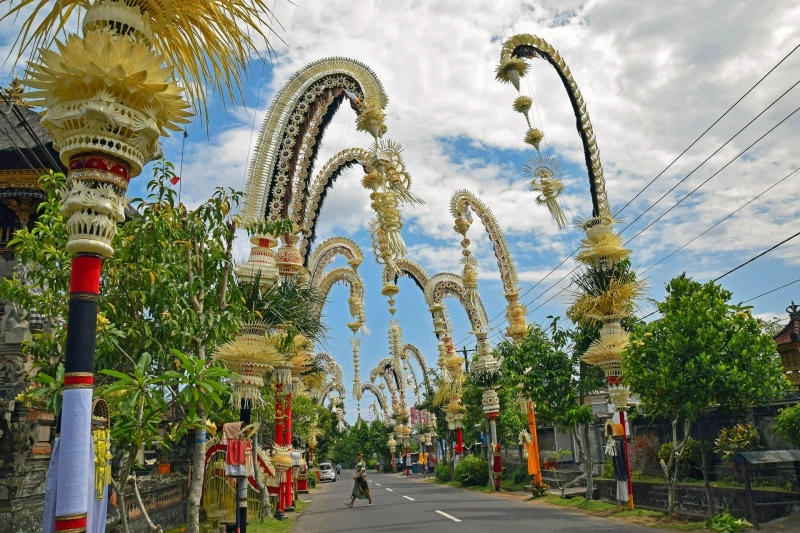Bali isn't just about the beaches and sunsets—it's also home to some of the most vibrant and spiritually rich cultural traditions in the world. Beyond the tropical aesthetics and Instagrammable views, Bali is deeply rooted in a calendar filled with sacred rituals and unique religious holidays. While Indonesia as a whole celebrates various Islamic and national holidays, Bali—thanks to its majority Hindu population—observes a set of completely different religious events.
Here are some of the most unique Balinese holidays that you won’t find anywhere else. If you're lucky enough to visit during one of these, you'll witness Bali at its most magical.
1. Galungan
Galungan is one of the most significant religious festivals in Bali. It celebrates the victory of dharma (good) over adharma (evil). The holiday symbolizes the time when ancestral spirits return to Earth to visit their descendants.
The hallmark of Galungan is the stunning penjor — tall, curved bamboo poles adorned with coconut leaves, fruits, and offerings that line the streets. Temples are full of activity, and families dress in their finest traditional attire. The spiritual energy of the island feels heightened, and even the most skeptical visitor can sense something powerful in the air.
Galungan occurs every 210 days based on the Balinese Pawukon calendar.
2. Kuningan
Ten days after Galungan comes Kuningan, a closing ceremony for the ancestral spirits who are believed to return to heaven. It’s a day of gratitude and spiritual reflection.
You’ll see special yellow rice dishes (hence the name "Kuningan," from the word kuning meaning yellow), traditional dance performances, and more penjor decorations. Temples across Bali are packed with locals offering canang sari and participating in sacred rituals.
It's believed that the gods and ancestors bless the island during Kuningan, making it a perfect moment to explore Bali's spiritual roots.
3. Nyepi (Day of Silence)
If there's one holiday that shocks visitors the most, it's Nyepi. Unlike any New Year celebration elsewhere, Bali's New Year (Saka New Year) is marked by total silence. Literally.
On Nyepi Day, the entire island shuts down. No flights, no traffic, no lights, no working, and for locals, not even cooking or entertainment. It's a full 24 hours of introspection, fasting, and silence.
The night before Nyepi, however, is the lively Ogoh-Ogoh parade, where giant demon effigies are carried through the streets to be symbolically destroyed. It’s a visual spectacle full of art, fire, and noise—a stark contrast to the peacefulness of the next day.
4. Saraswati Day
This holiday honors Dewi Saraswati, the Hindu goddess of knowledge, wisdom, and art. It usually falls on a Saturday and is especially important in schools and academic institutions across Bali.
Books are blessed in ceremonies, students wear traditional uniforms, and educational institutions hold special offerings. For anyone interested in Bali’s appreciation for knowledge and culture, Saraswati Day gives unique insight into how education and spirituality go hand in hand here.
5. Tumpek Landep
Tumpek Landep is a day of blessings for all things made of metal, especially vehicles, tools, and even computers or electronics. It's rooted in the belief that metal objects have a spiritual energy that supports human activity.
On this day, you'll see cars and motorbikes decorated with small offerings and flowers. Mechanics and craftsmen also participate by blessing their equipment. It’s a powerful reminder of how the Balinese integrate spirituality into every aspect of daily life.
6. Pagerwesi
Often referred to as "Balinese Guardian Day," Pagerwesi is a time to strengthen one's spiritual defense against negative forces. While not as visually elaborate as Galungan or Nyepi, it's deeply spiritual.
Offerings are made at homes and temples, and people are encouraged to reflect on their personal discipline, ethics, and inner strength.
7. Melasti
Melasti is a purification ritual held a few days before Nyepi. Entire villages walk to the beach, bringing temple heirlooms and sacred items to be cleansed in the sea. It’s a deeply moving event, often taking place during sunrise or sunset.
Dressed in white ceremonial clothes, locals perform prayers and offerings by the ocean. The whole atmosphere feels both sacred and cinematic—a spiritual detox for both humans and objects.
Ready to Enjoy Bali?
While immersing yourself in Bali's sacred holidays, don’t forget to explore its culinary traditions. One of the best ways to connect with the island's culture is through its food. From babi guling (suckling pig) to ayam betutu (slow-cooked spiced chicken), Balinese cuisine is rich, flavorful, and deeply tied to its ceremonies.
And the best place to enjoy it? A Balinese specialty restaurant, of course. Many local eateries offer traditional menus prepared the way Balinese grandmothers used to cook. Whether you're celebrating Galungan or simply looking to savor authentic flavors, visiting a traditional Balinese restaurant is a must.
So next time you plan your trip to Bali, check the calendar. You might be able to witness a once-in-a-lifetime festival and pair it with unforgettable food. Spirituality, tradition, and taste – all served on one vibrant island.


